Is Vajiralongkorn facing a health crisis?
Rumours about the monarch are at fever pitch in Thailand, but we don't yet know the seriousness of the king's condition
Earlier this week, rumours began flying around on social media and private chat groups that King Vajiralongkorn is severely ill. It’s become the main trending topic on Thai Twitter, with the hashtag #ข่าวลือ — #Rumour.
Somsak Jeamteerasakul, who has excellent sources, mentioned the rumours in a tweet two days ago, but stressed that he did not have confirmation.
I’ve been trying to find out more, but it’s extremely difficult to contact royal insiders these days because of the extreme risks they face if they are suspected of talking to journalists. However, trusted sources have told me that Vajiralongkorn did indeed seek treatment earlier this month at Bangkok Hospital, where he prefers to go for all his medical procedures, and that his condition became so serious that he had to be transferred to an intensive care unit at Siriraj Hospital.
According to these sources, the king was having trouble breathing, and was believed to be suffering from pneumonia or tuberculosis. Respiratory problems are among the main symptoms of the coronavirus, but there is no confirmation that Vajiralongkorn has been diagnosed with covid-19, and it would seem unlikely as it’s plausible to assume he was inoculated months ago, although we don’t know what vaccine was used.
My sources can’t confirm the king’s current condition, and people who went to Siriraj Hospital over the past couple of days saw no sign of a heightened security presence. So it’s possible he has already mostly recovered.
Several more sensational rumours say he is severely ill, and has suffered acute renal failure, or even something more severe, but so far I have been unable to confirm whether this is true. If the king was believed to be on the verge of death, we would expect to see signs of intense activity by the Thai regime, and Prince Dipangkorn would be likely to return from Germany, but so far there has been no evidence of that.
There have been rumours about Vajiralongkorn’s health for decades. There is strong circumstantial evidence that he contracted HIV in the late 1990s, but with his huge wealth this is a condition that can be effectively managed. It is also widely suspected that he has had some form of leukaemia and has been keeping it in remission with the help of regular blood transfusions in Germany. This was mentioned in a secret US cable from 2009 that was published by WikiLeaks, which said:
Vajiralongkorn is believed to be suffering from a blood-related medical condition (varying sources claim he is either: HIV positive; has Hepatitis C; is afflicted by a rare form of “blood cancer,” or some combination which leads to regular blood transfusions).
It’s clear from what trusted sources have told me and other evidence that the king has faced some kind of health issue recently. He has not been seen on royal news broadcasts doing any official duties since the start of May. He did not appear for any ceremonies to mark the second anniversary of his coronation on May 4, and also did not join the Royal Ploughing Ceremony on May 10.
The king’s private secretary, Air Chief Marshal Satitpong Sukvimol, announced in a letter on April 27 that the Coronation Day and Royal Ploughing Ceremonies had been cancelled, along with Visakha Bucha Day rituals on May 26, because of the third wave of the coronavirus pandemic which Thailand has not yet managed to get under control.
However, the Royal Ploughing Ceremony actually went ahead after all, at Chitralada Palace, presided over by the 77-year-old Privy Council chief Surayud Chulanont, and with various officials in attendance including notorious convicted drug smuggler Tamanat Prompow. No royals joined the ceremony. The fact it went ahead, though without a royal presence, shows that the palace was not being honest that ceremonies were being cancelled because of the pandemic.
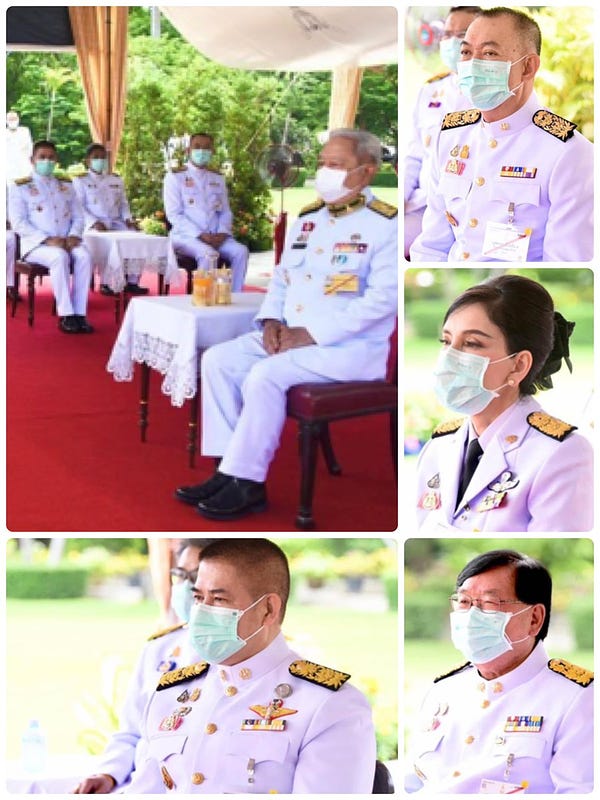
Some royal sources are insisting the king is absolutely fine. The palace has not released any statement so far, but the usually well-informed monarchist Royal World Thailand social media site reported yesterday that a palace source had told them: “Everything is still fine.” It said Vajiralongkorn was reported to be exercising regularly at Amphorn Sathan Palace, his home when he’s in Bangkok. However, the post was written in a strikingly ambivalent way, noting that Vajiralongkorn has had respiratory problems in the past, and that palace officials often don’t tell the truth.
Bangkok Post military correspondent Wassana Nanuam, another favoured palace conduit for royal news, also claimed the king is doing fine, and even that he is regularly playing volleyball and basketball, which would be impressive for a 68-year-old who has looked unsteady and unwell during recent public appearances.
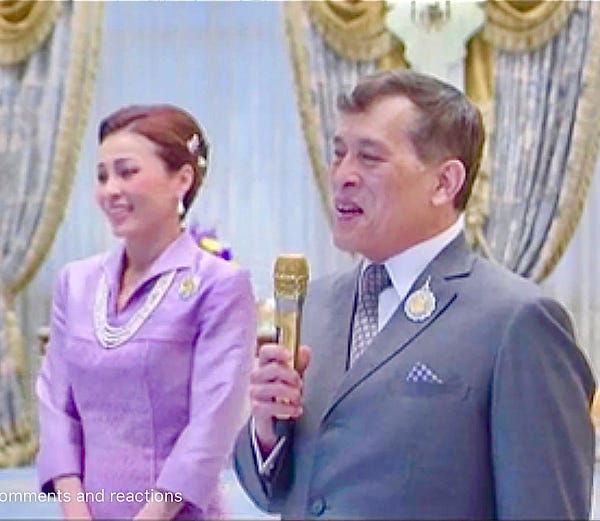
But we know from past experience that the palace cannot be trusted to give accurate updates on the health of the Thai royals.
H.G. Quaritch Wales, an advisor to King Vajiravudh and King Prajadhipok last century, wrote in his 1931 book Siamese State Ceremonies that royal health was a taboo issue because acknowledging that “the King could be subject to the ills of the flesh as were ordinary mortals” contradicted the mythology that royals were godlike beings. It was also forbidden to mention that one day the king would die, and so euphemisms had to be used, and this practice has continued into the 21st century. In the final years of King Bhumibol’s reign, most media discussion of his impending death, and even confidential US cables, preferred to use phrases like “passes from the scene” or “leaves the scene”.
King Chulalongkorn’s death from kidney failure in October 1910 came as a shock to most Thais — and even his son and heir Prince Vajiravudh — who had been unaware how serious his condition was. As Walter Vella wrote in his 1978 book Chaiyo!: King Vajiravudh and the Development of Thai Nationalism:
When Chulalongkorn died on October 23, 1910, he had been king for forty-two years. Most of his subjects could remember no other. The special royal word for the death of a king (sawannakhot) felt strange on the lips to older courtiers; it was meaningless to the young.
Despite the length of his rule—the longest in Thai history—the King was not old; his death was totally unexpected. Chulalongkorn had celebrated his fifty-seventh birthday a month before his death. Although he had had periodic bouts of illness over the years, he had not been ill for some time before his fatal attack. The progress from the first complaint of “stomach trouble” to coma and death was but a week. Not even the highest princes in the court knew the seriousness of the King’s condition. Less than forty-eight hours before he died the First Queen had reported that “His Majesty has improved in all respects.”
Crown Prince Vajiravudh, whose residence at Saranrom Palace put him some distance away from Dusit Palace, where the King had been staying, was probably less well informed about his father’s illness than most. In fact, on the morning of the King’s final day, Vajiravudh had had to be awakened to be summoned to Dusit Palace.
As Paul Handley discusses in The King Never Smiles, during times when King Bhumibol was severely unwell during his reign, including with severe heart problems, the palace tried to hide the severity of his condition, releasing staged images and footage allegedly showing him hard at work.
In the last years of Bhumibol’s life, the palace continued to routinely lie about his health, as leaked US cables show. When Bhumibol was hospitalised in October 2007, the palace said the problem was “inadequate blood flow to his left cerebral cortex, resulting in weakness on the right side of his body”. In fact, as palace officials acknowledged to the US ambassador, Bhumibol had suffered a stroke. The palace also lied when the king was hospitalised on September 16, 2009 — it waited four days to make a statement, and then falsely gave September 19 as the date he entered hospital.
In a meeting with the US ambassador in November 2007, Bhumibol’s deputy principal private secretary, Tej Bunnag, said the topic of the king’s death was so taboo that no official planning could take place for it, or even for the funeral of the monarch’s sister, Princess Galyani. The discussion was recorded in a secret cable:
With due sensitivity to the issue, the Ambassador asked whether anyone was engaged in planning for funeral arrangements, in the event of the Princess' or King's passing. “Absolutely not,” replied Tej, noting that this would be culturally taboo. The Ambassador asked whether Galyani's death would be marked by a 100-day mourning period; Tej said this scenario sounded plausible, but nothing had been determined. Tej also explained there would be no advance planning for how to respond to the King's death; the Privy Council would determine what to do after the event.
At the conclusion of the meeting, Tej highlighted the extraordinary sensitivity of the matters they had discussed. He sought and received the Ambassador's assurance of complete confidentiality regarding his remarks.
Of course, plenty of people in the Thai elite were planning and plotting how to handle the succession, but none of this could be done officially, because it was regarded as blasphemous to formally prepare for Bhumibol’s death.
As Bhumibol sank deeper into decrepitude and senility, official health bulletins from the palace always claimed that his health was improving, although they began to list a longer litany of ailments. It was only on October 9, 2016, just four days before his death, that the Royal Household Bureau announced he was so ill that doctors had advised him to stop working, and for the first time failed to say his condition was improving. This announcement was pure fiction too — Bhumibol had been comatose for months by this stage, and had not done any real work for years — but the fact the palace was belatedly admitting that the king was no longer tirelessly performing his duties was a coded signal that the end was near.
Thais were not told the truth about Queen Sirikit’s severe stroke after she collapsed in the grounds of Siriraj Hospital in July 2012 either. The statement from the palace deliberately downplayed the seriousness of her condition, as AP’s report on it shows:
Doctors have advised Thailand’s Queen Sirikit to rest after an exam showed a slight reduction in blood flow to her brain.
The Royal Palace announced Sunday that the 79-year-old queen had felt dizziness and staggered slightly while walking for exercise a day earlier. However, she remained conscious and could speak.
It said a physical examination and a magnetic resonance imaging scan showed a slight shortage of blood in the cerebellum, but no hemorrhaging.
The palace has also never explained what is wrong with Prince Dipangkorn, heir apparent to the throne.
So it’s clear that whatever the seriousness of Vajiralongkorn’s current condition, we can’t expect honest information from the Royal Household Bureau. If they start releasing statements confirming that he is ill, that will be a sign that his condition is very serious, much more severe than the palace is officially reporting. The absence of any statement, and bland comments from palace officials to royalist reporters claiming he is “fine”, don’t give us any useful information at all.
The fact that official royal statements can’t be trusted to tell the truth — and indeed, almost never come even close to telling the truth — means rumours and gossip thrive. Some of the rumours may be deliberately spread by enemies of Vajiralongkorn, and indeed it would not be the first time this has happened. In 2007, very senior establishment sources spread a rumour that Vajiralongkorn had died of AIDS, around the same time that an infamous video was leaked of the 2001 birthday party of his third wife Srirasmi, during a period of intense palace infighting. It’s possible that something similar is happening again, and that the seriousness of Vajiralongkorn’s health condition is being exaggerated.
The job of journalists like me is to try to separate fact from rumour, and it’s a really difficult task. So far, all I can say with confidence at this stage is that the king has had a fairly serious health scare, but we don’t yet know how severe it was, or if it is still ongoing. I’ll continue to seek information and post updates on whatever I can find out.
Meanwhile, for anyone interested, earlier this year I posted an analysis of royal succession dynamics after Vajiralongkorn’s death.
As Somsak said on social media today, one way the Royal Household Bureau has dispelled health speculation in the past is by sharing footage and photographs of the monarch walking around and looking healthy:
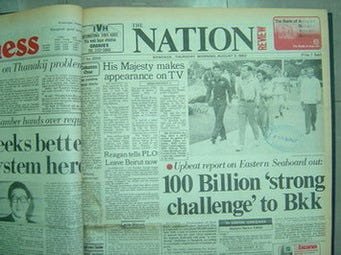
However, given the known dishonesty of the palace, and the ease with which footage can be faked, or old pictures recycled, it may be difficult for the Royal Household Bureau to end rumours about Vajiralongkorn’s health unless they can show him clearly looking fit and well at an event that we know just happened (if they showed him playing volleyball or basketball at a public event that would be particularly effective). Until then, we just have to try our best to decode what little evidence we have, and wait and see how the situation develops.
Thais deserve to know the truth, but unfortunately the palace has no interest in telling them.

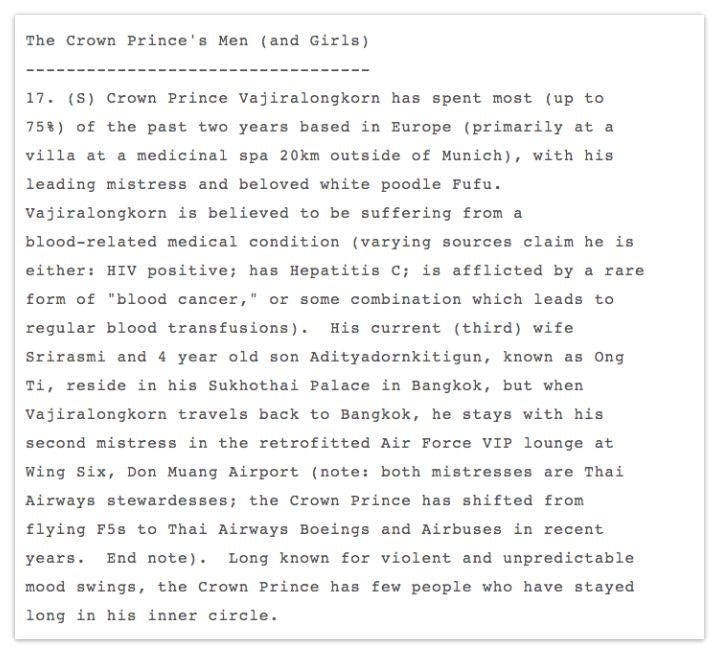
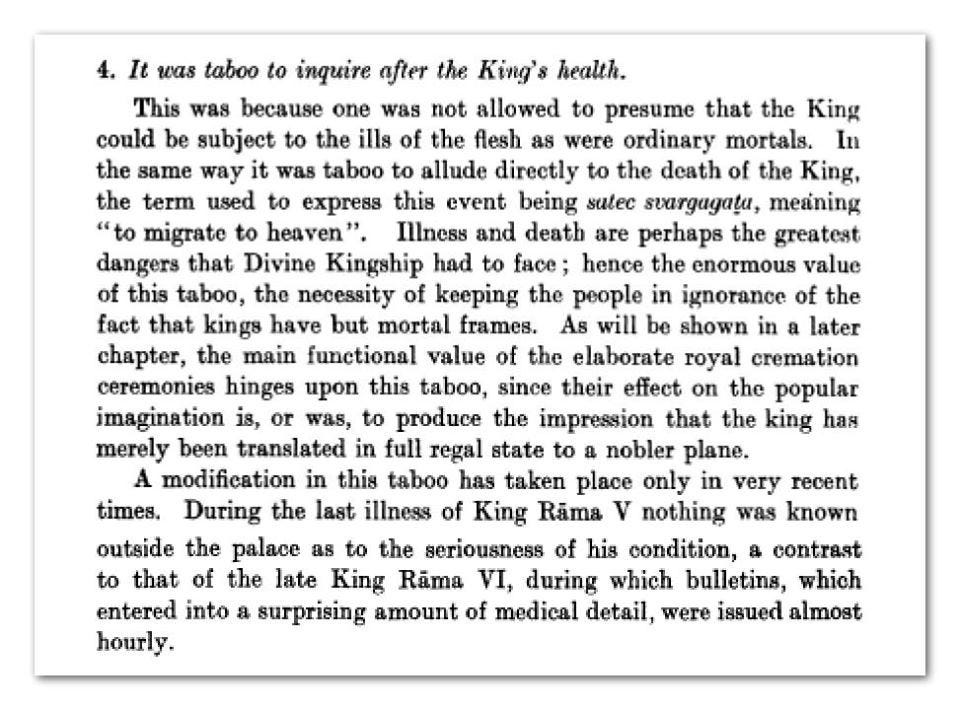
Inga kommentarer:
Skicka en kommentar